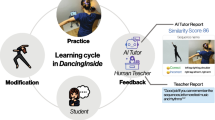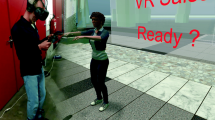Abstract
In learning/training activity of physical tasks such as sport, aerobic exercise, rehabilitation, or dance, it usually involves an instructor and one or more learners. Since it is hard for the instructor to propagate his(her) knowledge to the learners merely by oral instructions, the instructor usually has to demonstrate exemplary movements, figures out the movements which are error-prone to the learner. The learner observes the instructor’s movements, mimics them. In the whole activity, each of them observes the interaction partner’s body movements, talks to the partner and may intercept the partner’s action.
Access this chapter
Tax calculation will be finalised at checkout
Purchases are for personal use only
Similar content being viewed by others
References
Chan, J.C., Leung, H., Tang, J.K., Komura, T.: A virtual reality dance training system using motion capture technology. IEEE Transactions on Learning Technologies PP(99) (2010)
Chua, P.T., Crivella, R., Daly, B., Hu, N., Schaaf, R., Ventura, D., Camill, T., Hodgins, J., Pausch, R.: Trainning for physical tasks in virtual environments: Tai chi. In: IEEE Virtual Reality, VR 2003 (2003)
Nakamura, A., Tabata, S., Ueda, T., Kiyofuji, S., Kuno, Y.: Dance training system with active vibro-devices and a mobile image display. In: IEEE/RSJ International Conference on Intelligent Robots and Systems, IROS 2005 (2005)
Nakamura, T., Makio, K., Uehara, K.: Discovering and translating skills from motion data. Tech. Rep. CS24-2006-3, Department of Computer and Systems Engineering, Kobe University, Japan (2006)
Author information
Authors and Affiliations
Editor information
Editors and Affiliations
Rights and permissions
Copyright information
© 2011 Springer-Verlag Berlin Heidelberg
About this paper
Cite this paper
Uejou, M., Huang, HH., Lee, J., Kawagoe, K. (2011). Toward a Conversational Virtual Instructor of Ballroom Dance. In: Vilhjálmsson, H.H., Kopp, S., Marsella, S., Thórisson, K.R. (eds) Intelligent Virtual Agents. IVA 2011. Lecture Notes in Computer Science(), vol 6895. Springer, Berlin, Heidelberg. https://doi.org/10.1007/978-3-642-23974-8_70
Download citation
DOI: https://doi.org/10.1007/978-3-642-23974-8_70
Publisher Name: Springer, Berlin, Heidelberg
Print ISBN: 978-3-642-23973-1
Online ISBN: 978-3-642-23974-8
eBook Packages: Computer ScienceComputer Science (R0)




